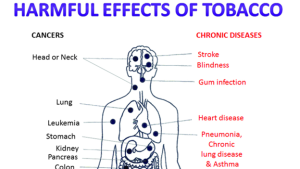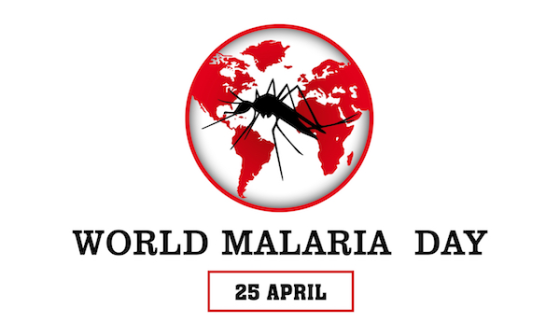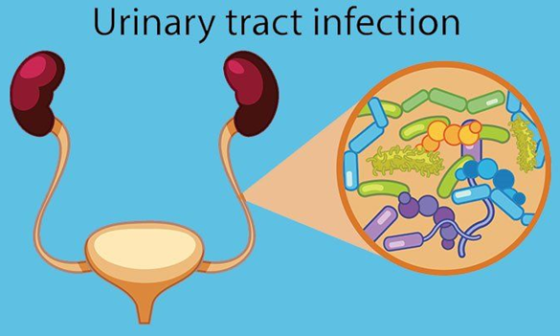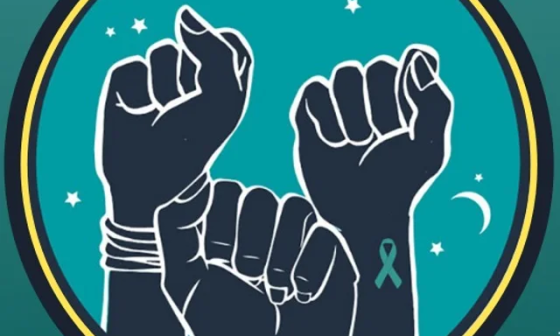Tobacco, in its myriad forms, is known to be a public health concern and has been a subject of discussion for many years. Tobacco smoking is one of the forms by which humans ingest tobacco and is known to inflict a plethora of detrimental effects on individuals and societies alike.
Despite widespread awareness campaigns and legislative measures, its grip remains tenacious, as millions of people remain addicted to this product. It is worth noting that all forms of tobacco use are harmful and addictive as there are no safe levels of exposure to tobacco.

Credit: Types of Tobacco by State of Michigan
In Africa, cigarette smoking is the most common form of smoked tobacco use. Tobacco use can be broadly categorised into two main categories: smokeless and smoked.
- Smoked tobacco includes; cigarettes (rolled paper cylinders filled with processed tobacco leaves that are burned and inhaled), cigars (similar to cigarettes but unlike cigarettes, they are not usually inhaled deeply as the tobacco leaves are often cured differently with stronger flavor), cigarillos, pipe Tobacco.
- Smokeless tobacco includes; chewing tobacco (tobacco leaves are placed between the cheek and gum), snuff especially found in rural parts of Africa (finely ground tobacco placed between the gum and lip), dissolvable tobacco (flavoured smokeless tobacco that comes in small tablets or lozenges that dissolve slowly in the mouth).
Tobacco use, primarily through smoking cigarettes, is the leading cause of preventable death globally and also in Africa. The harmful chemicals in tobacco wreak havoc on your body, leading to a multitude of health problems. With this article, WellaHealth focuses on the detrimental effects of smoking on human health.
Tobacco’s Effect

Credit: The Guardian Newspaper
Tobacco affects those who inhale and ingest it in various forms. Additionally, smoked tobacco can also have detrimental effects on those around smokers as this is known as “second-hand smoking”. We would discuss the impact of tobacco under effects on tobacco users (smokers, chewers, and sniffers) and its impact on others.
Tobacco Effects on its Users
- Damage to lungs: Smoking tobacco irritates and inflames the airways which can eventually lead to non-communicable Respiratory illnesses such as chronic obstructive pulmonary disease (COPD) (emphysema and chronic bronchitis). In the long-term, respiratory diseases caused by smoking make breathing difficult and can significantly reduce quality of life.
- Lung cancer: According to the World Health Organization, tobacco use is the leading cause of lung cancer as tobacco has been known to contain over 7,000 chemicals, and contains carcinogens such as N-Nitrosamines (TSNAs), that are known to damage DNA that predisposes a user to uncontrolled growth of cells and ultimately the formation of tumors.
- Cardiovascular diseases: Tobacco has been found to damage small blood vessels, increasing a user’s risk of developing blood clots that lead to heart attacks and stroke. Additionally, tobacco users have a higher than normal risk of developing high blood pressure, especially from smoking tobacco as scientists suggest that tobacco raises blood pressure thereby increasing the risk of cardiovascular complications.
- Cancer Beyond the Lungs: Apart from N-nitrosamines other known carcinogenic compounds present in tobacco include polycyclic aromatic hydrocarbons, benzene, and formaldehyde. Tobacco users are more susceptible to developing oral cancers, especially from chewing tobacco or smokeless tobacco, oesophagal cancer, bladder cancer, and pancreatic cancer.
- Weakened immune system: Smoking has been documented by researchers to increase users’ risk of falling ill especially bacterial and viral infections due to a weakened immune system.
- Diabetes: There is documented research on tobacco use increasing a user’s risk of developing type 2 diabetes.
- Bone health problems: Tobacco smoking can contribute to osteoporosis, a bone condition that weakens bones and increases a user’s risk of pathologic fractures.
- Infertility or poor reproductive health: Smoking can harm fertility in both men and women and increase the risk of complications during pregnancy as well as contribute to erectile dysfunction in men.
- Other health effects: Impair your sense of taste and smell, premature ageing of the skin, and cause teeth stains and plaque (gingivitis and periodontal health).
The Effects on Others
Smoked tobacco can affect others (family, neighbours, and friends). Second-hand smoke is the smoke that fills restaurants, offices, homes, or other enclosed spaces when people smoke tobacco products. Second-hand smoke exposure also poses significant health risks, especially to children.
Children exposed to secondhand smoke are more likely to develop respiratory problems, ear infections, and even sudden infant death syndrome (SIDS).
There is no safe level of exposure to second-hand tobacco smoke. Second-hand smoke causes serious cardiovascular and respiratory diseases, including coronary heart disease and lung cancer.
Tobacco Cessation Programs
Several tobacco cessation programs in Africa can be made available to users depending on their preferences and their needs. These programs include telemedicine support, group support, counselling services by psychologists, and nicotine replacement options.
- Telemedicine quitlines: Quitlines are 24/7 toll-free phone numbers where trained counsellors offer support, information, and encouragement throughout the quitting process.
- Counselling and behavioural therapy services: Therapy sessions can equip users with coping mechanisms, address triggers, and build confidence in quitting. Psychotherapists help users navigate the dependence and emotional challenges of quitting.
- Nicotine Replacement Therapy (NRT): Replacement materials given after due consultations with doctors come in different forms like patches, gum, lozenges, or inhalers are known to help tobacco users quit as these replacements provide controlled doses of nicotine to help manage withdrawal symptoms.
- Support Groups: Support groups provide tobacco users with connections to help them quit. Support groups ensure that users connect with other users who are trying to stop, and this can provide invaluable support, encouragement, and a sense of community.
Conclusion
In conclusion, tobacco use is a significant threat to users’ health and the health of those around them. Quitting tobacco use remains one of the best decisions African users can make for their overall well-being. Numerous resources and support programs are available to help you quit tobacco for good, visit the nearest hospital, or use the help of telemedicine physicians on WellaHealth today!
If you want further health information that is accessible and affordable for you and your family send a WhatsApp message today to WellaHealth!
Dr. Ifeoma M. Uduh





